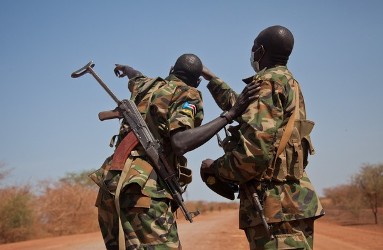Khartoum dismisses Juba’s accusations of SAF military activity along borders
April 9, 2014 (KHARTOUM/JUBA) – The Sudanese government today rejected accusations by Juba of conducting “unusual movements” along the borders describing it as “lies”.

Furthermore, the Unity state’s deputy governor Stephen Mabek Lang told Sudan Tribune in a separate interview on Tuesday that “there have been reports since last week from our forces about unusual movement of the Sudanese army along the border area, which is a clear evidence of [a] lack of respect and coercion and intimidation”.
Lang said his country would continue to respect the terms of a government agreement, but would not accept any revisions of the border line outside the previous agreement between the two countries.
“As the government we will continue to respect the terms of the agreements with the government of Sudan, especially the cooperation agreement, which was why our president visited Khartoum recently. It was to show the commitment of the government of the Republic of South Sudan,” Lang said.
“But now it is appearing that someone wants to redefine the boundaries by force, which is a clear violation of territorial integrity and sovereignty of another independent state,” he added.
Lang said several local sources in Pariang county witnessed Antonov bomber and MiG jets flying over the Panyang area between about 9am and noon (local time). He further claimed that Sudanese jet fighters dropped at least 10 bombs, destroying one car and forcing civilians to flee from Panyang to Pariang.
On Wednesday, South Sudan’s government officially accused Khartoum with which it contests the ownership of areas separating the two nations, of harbouring rebels fighting to depose president Salva Kiir, despite a cooperation agreement between the two sides.
“The rebels of Riek Machar have been carrying out attacks on the positions of the SPLA in Upper Nile for the last few days. They carried out attacks on the 6th and today on 9 April, in Kaka Tajaria. They carried out [the] attack aided by the militia group based in South Kordofan, which is against the cooperation agreement,” Aguer told Sudan Tribune on Wednesday.
He said the attack forced troops loyal to the government to “tactically withdraw” from the area.
“The attack on Baliet and Adong by the rebels of Riek Machar, who uses Galachel as the base of their operation and attacks comes from Sudan,” Aguer said in a statement broadcast by the state-owned South Sudan Television (SSTV) on Wednesday.
However, the spokesman for the Sudan Armed Forces (SAF), Colonel Al-Sawarmi Khaled Saad, hit back at Juba’s accusations, saying that Khartoum has been monitoring the ongoing war in South Sudan and that its position remains the same, in that it is seeking an end to the current crisis and to lay the foundations for security and stability with an emphasis on the legitimacy of Juba’s government.
In a statement released on Wednesday, Saad denied SAF troops had made hostile movements along the borders between the two countries.
He said the allegations had caught SAF by surprise and that the remarks by other South Sudanese officials included lies, describing the claims as implausible and lacking credibility.
“We affirm that we have [made] no movements toward the state of the South and there is no hostility nor war or deployments there, and we are more keen on advanced relations between the two countries, and we are awaiting for the positive outcome of the recent visit by South Sudan’s head of state to Sudan in order to further agreements of mutual cooperation between the two states,” the SAF spokesman said.
He added that Khartoum is also awaiting the fulfillment of promises made regarding the implementation of security arrangements to determine the zero line, opening of border crossings and the formation of joint monitoring mechanisms between the two countries to verify implementation of these agreements.
“However, we have not seen any implementation or response to implement these mechanisms on the part of [the]South Sudan state. We are still waiting for the reply which was promised during the recent visit of president Salva Kiir,” Saad said.
Violence erupted in the South Sudanese capital, Juba, in mid-December last year killing thousands and displacing more than a million people. President Kiir accused his former deputy Machar of instigating the violence, which the latter vehemently denied.
Prior to the South Sudanese conflict Juba and Khartoum agreed to normalise relations and to implement a cooperation agreement signed in 24 September 2012. The two countries have, however, failed to deploy a joint force to monitor the border due to differences over the baseline for the demilitarised security zone, known as the zero line.
The Sudanese president has maintained support for his South Sudanese counterpart since his visit to Juba on 6 January. However, the two countries denied they had agreed to sign a security agreement to deploy a joint force to protect South Sudan’s oil fields from rebel attacks.
(ST)
– S. Sudan warns of “unusual movement” of Sudanese army in border areas
